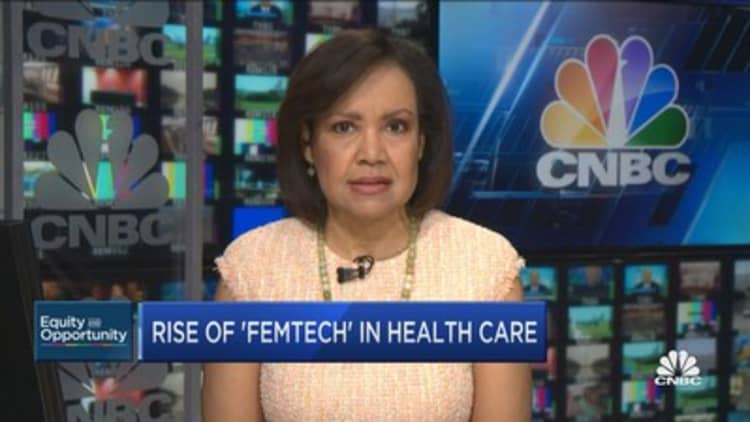
Investors are overlooking a significant segment of the technology industry due to its perceived “taboo” nature, despite the fact that it is projected to reach a value of $1 trillion by 2027.
The FemTech sector encompasses all innovations aimed at addressing health issues unique to, different for, or disproportionately affecting women. This includes everything from pregnancy and menopause health to Alzheimer’s and HIV.
Women make up over 50% of the global population, making the target market for women’s health products massive. However, only 3.3% of digital health investments in the U.S. between 2011 and 2020 were allocated to women’s health, according to digital consultancy Rock Health.
Nurturing innovation in female health not only benefits women but also has a positive economic impact. A $300 million investment in improving female health could generate approximately $13 billion for the global economy, as suggested by research from Women’s Health Access Matters, a nonprofit organization focused on funding women’s health research.
Research by Women’s Health Access Matters suggests that a $300 million investment into improving female health could generate around $13 billion.
De Agostini Picture Library | De Agostini | Getty Images
“The opportunities and potential value creation in investing in this area are enormous,” said Karen Taylor, research director of the Centre for Health Solutions at Deloitte, to CNBC.
“If investors did more thorough research, they would understand why this is a ripe area for growth and investment,” added Taylor.
“They just didn’t really get it”
In 2013, Tania Boler founded Elvie, a tech company focused on women’s health, after noticing a lack of products designed for new mothers. Elvie’s flagship products include pelvic floor trainers and portable breast pumps.
However, not everyone took her new business seriously.
“To be completely honest, the tech industry thought it was a joke,” Boler told CNBC.
“They just didn’t really get it… In many women’s health issues, the lack of education and demand is a problem. From an investment perspective, the thesis is not clear,” explained Boler.
Investment decisions are often influenced by personal understanding of a product, but statistics show that most investment decisions are made by men. A 2022 report by European Women in VC revealed that only 15% of VC general partners were female.
Despite these challenges, Elvie has achieved significant success. It is now one of the leading companies in the FemTech space, with a revenue of $100 million. There are inspiring stories of women running marathons and performing surgery while using Elvie pumps to express milk, highlighting the human impact of investing in women’s health.
“We convey a strong message of empowerment while addressing taboos directly. We don’t shy away from that. And that initiates the conversation,” said Boler.
The lack of understanding of women’s health and the importance of gender-specific health solutions has deep-rooted causes.
“Due to its taboo nature, overcoming this issue is extremely challenging,” said Valerie Evans, consumer investor at venture capital fund The Craftory.
“It’s not because investors don’t want to understand or deliberately remain ignorant. It’s an overall societal problem that permeates the investing world,” Evans explained.
Furthermore, the gender balance within company teams can also affect the difficulty of securing backing from investors.
‘Being angry feminists hasn’t worked’
According to McKinsey & Company, over 70% of FemTech companies have at least one female founder, compared to the average of 20% across all sectors.
However, this puts them at a disadvantage.
In 2020, less than 3% of venture capital funds were invested in female-led startups, as indicated by data from INSEAD business school. Female entrepreneurs are 63% less likely to receive VC funding than their male counterparts.
Taylor from Deloitte noted that female founders generally ask for less funding than their male counterparts, which could hinder their prospects in the industry.
“Numerous studies show that women tend to downplay the potential of their innovation, being more honest about it. On the other hand, men are known for their overselling skills, and investors are accustomed to that,” she pointed out.
Economies will grow when women can birth taxpayers and not die in the process
Brittany Barreto
Founder and CEO of FemHealth Insights
Brittany Barreto, founder of FemTech analytics platform FemHealth Insights, emphasizes the importance of startups providing accurate data to investors in light of these statistics. If they cannot rely on personal experiences to appeal to male venture capitalists, they can present robust information.
“It was crucial for us to focus on data because solely being angry feminists hasn’t yielded results yet. So I thought, let’s be scientists and business professionals,” Barreto explained.
The FemTech sector is experiencing remarkable growth. More than 60% of FemTech startups were founded in the five years leading up to 2022, and the number of businesses in the industry has increased by 1,000% in the last decade, according to research by FemHealth Insights.

Despite the numerous obstacles, the FemTech industry’s growth rates are encouraging.
“I am incredibly optimistic about the future of women’s health,” said Barreto, emphasizing the potential benefits for the world.
“The empowerment of women to improve their well-being, live longer, and have better mobility has enormous economic potential. Women possess purchasing power, and economies will thrive when we prioritize women’s health,” she added.
Denial of responsibility! VigourTimes is an automatic aggregator of Global media. In each content, the hyperlink to the primary source is specified. All trademarks belong to their rightful owners, and all materials to their authors. For any complaint, please reach us at – [email protected]. We will take necessary action within 24 hours.


